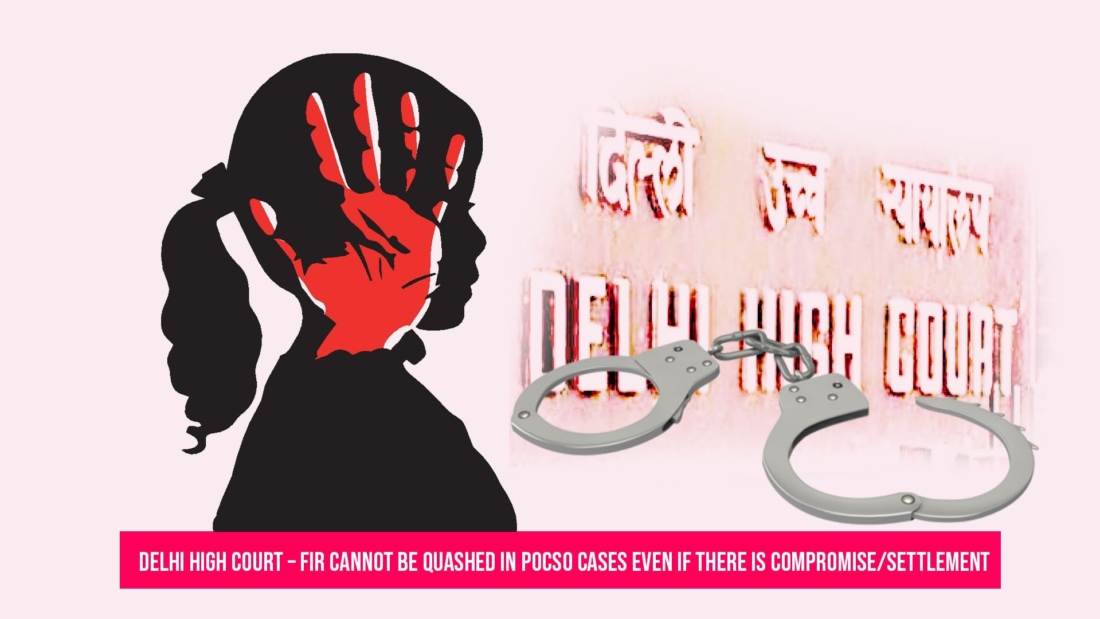In a recent judgment on 29th January 2021, the Delhi High Court had refused to permit quashing of First Information Report (“FIR”) merely on the ground that the parties have entered into a compromise. The FIR in this case was related to heinous offences against small children under sec. 377 of Indian Penal Code (“IPC”) read with Section 4 of Protection of Children from Sexual Offenses (“POCSO”) Act, 2012. The petitioner had filed this petition under Section 482 Criminal Procedure Code (“CrPC”) for quashing of the FIR. In this case of Sunil Raikwar vs. State & Anr. a seven-year boy was sodomised by the accused who lived in the same building. The father of the child found that the underwear of the child was wet with blood. After the final report was filed, very surprisingly the petitioner filed for quashing of the FIR primarily on the ground that due to intervention of elders of the society and friends, the parties have decided to amicably put an end to the disputes and differences. A similar affidavit was filed by the respondent.
Section 377 IPC and Section 4 of the POCSO Act are non-compoundable offences. In State of Maharashtra vs. Vikram Anantrai Doshi & Ors [(2014) 15 SCC 29)] it was held that while exercising powers under Section 482 CrPC to quash criminal proceedings for non- compoundable offences on the basis of compromise, the High Court should scan the entire facts to find out the thrust of allegations and the crux of the settlement. The Supreme Court in Narinder Singh & Ors vs. State of Punjab & Anr [(2014) 6 SCC 466] had observed that the guiding factor in such cases of quashing should be to secure either ends of justice or to prevent abuse of the process of any court. It was also held that such a power should not to be exercised in those prosecutions which involve heinous and serious offences of mental depravity or offences like murder, rape, dacoity, etc. because such offences are not private in nature and have a serious impact on society. In Parbatbhai Aahir & Ors vs. State of Gujarat & Anr [(2017) 9 SCC 641] the Court stated that the decision to continue with the trial in such cases is founded on the overriding element of public interest in punishing persons for serious offences.
In the present case, the victim is a small boy of seven years and the offence alleged against the petitioner is grave. The Court expressed that the POCSO Act was enacted only because sexual offences against children were not being adequately addressed by the existing laws and the purpose of the Act was to provide protection to children from sexual assault and sexual harassment and for safeguarding the interest and well-being of children. Permitting such offences to be compromised and quashing FIRs will not secure the interest of justice.
The Court also opined that since the father of the victim is not the victim therefore, he does not have the right to settle the dispute with the accused. Deterrence to others committing similar offence is a must and they cannot get a signal that anything and everything can be compromised. Deterrence to others committing similar offence is a must and they cannot get a signal that anything and everything can be compromised.
Therefore, the Court held that the FIR cannot be quashed merely because the father of the victim has decided to enter into a compromise with the petitioner/accused. Accordingly, the petition was dismissed.
– Adv. Shivangi Prasad – Corporate Lawyer, External Member & Trainer, Head – Legal & Compliance, Partner Child Safety at Work & Vaishali Jain, Paralegal – Child Safety at Work
 Cart is empty
Cart is empty 

